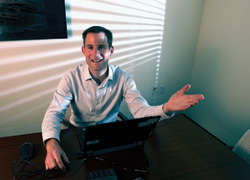Product manager helps partners build better client budgets. Is that revolutionary?

Photo of Kevin Vaarsi by Norbert Von Der Groben.
Is Fenwick & West’s product manager position the best thing since sliced bread? Or is the idea behind it as stale as the original loaf?
“I think it’s a new term for an old concept,” says Ed Poll, who heads LawBiz Management in Venice, Calif.
Peter Zeughauser agrees to a point, but still gives the firm props. “It’s fair to say other firms have done it,” says the chairman of Zeughauser Group in Newport Beach, Calif. “It’s also fair to say Fenwick is a change leader. It’s one of a group of firms that has done something innovative to engage in a more intelligent conversation with clients about pricing. I give them a lot of credit for it.”
The Fenwick product manager’s job is simple. He helps clients understand the potential cost of their legal matter and the variables that could spike or lower the ultimate expense.
“My role is scoping and pricing matters, and educating our lawyers on options available to clients,” says Kevin Vaarsi, who stepped into the job at the West Coast firm in July 2012. He spent 12 years in marketing and business development positions in the legal industry before taking the Fenwick post.
Vaarsi works in the background, not connecting with clients but assisting lawyers in creating budgets for client matters.
“We have historical data on what past matters have cost,” he explains. “We can give clients an estimate and what might move that estimate up or down. As matters progress, we can give updated budgets and estimates based on new information.
“When I meet with partners to discuss a matter,” he says, “I provide guidance on pricing options as well as the benefits of using Fenwick for the particular matter. We frequently provide clients options for both hourly and alternative-fee arrangements that make sense given the specific scenario or that they have requested.”
Isn’t that what every good partner does when a client asks the inevitable cost question? Perhaps, but Fenwick contends this is exponentially more nuanced advice based on five years of data.
“We spent a lot of time over the last years really building our sophistication in terms of the data we have and our ability to analyze it,” explains Kate Fritz, Fenwick’s managing partner, who practices out of San Francisco. “There are all kinds of variables we have insight into.”
Example: If it’s a litigation matter, what kind of litigation is it? If it’s patent litigation, how many patents are involved? What court is the case in? Is the client one that wants to outsource discovery or other tasks?
“We look at our legal services the way any other company looks at the products it’s delivering to clients, not just making sure the content works but [looking] at the pieces that comprise the product package,” says Fritz. “Not every customer wants all the accessories.”
THE RISKS OF TRANSPARENCY
Might cost candor backfire? “There are always people who say they’re better off not being so clear because they’ll scare clients away,” says Zeughauser. “The reverse is true. The more transparency, the more comfortable clients feel—and the more likely you’ll get that business.”
Still, Poll’s not convinced there’s much new at Fenwick other than a job title. “Fenwick may never have done this before, but it’s been done,” he says. “Other firms don’t call the position a product manager. They call it the leader of the team for Project A with Client B. What they’re really doing is saying: ‘As a consequence of technology we didn’t have 15 years ago, we can now capture certain information. … We can unbundle the work, and you can do portions A and B in-house to save money.’ It’s a client-relations position.”
Maybe so, says Zeughauser, but Fenwick gets points for moving the pricing discussion forward.
“It shouldn’t be pooh-poohed,” Zeughauser says. “Fenwick is smart. It’s taking it to a step beyond estimating that most partners do with their recollection and experience. And let’s face it, some partners have more experience than others. … It’s not the only firm trending in that direction, but it’s good.”
It’s not just good, asserts Fritz. It’s necessary.
“This is the way clients are driving us in the future,” she says. “For many years, law firms were exempt from providing the information around costs that anybody else was, and we’re not anymore. If we can’t provide this information, it’s a challenge for law firms in the future. Clients are expecting it, and rightly so.”



